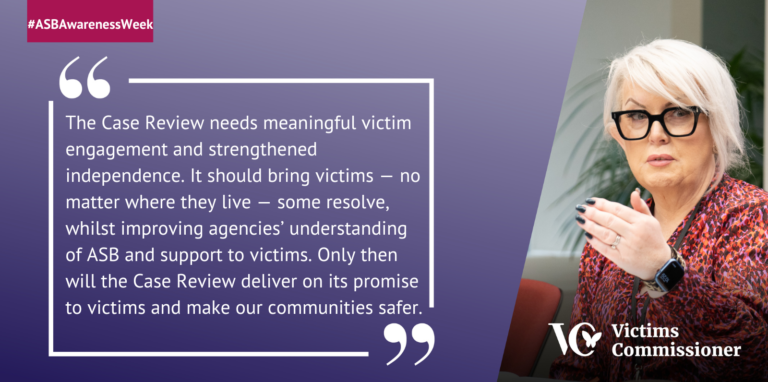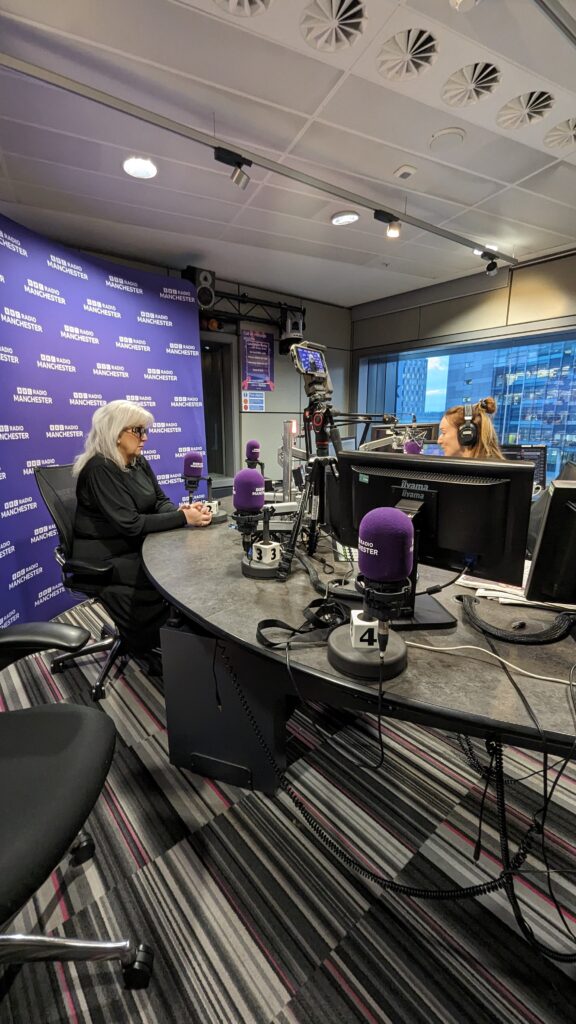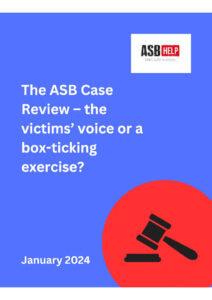Giving victims a voice: Reforming the ASB Case Review

For the ASB Case Review to be a force for good, victims of anti-social behaviour need and deserve a seat at the table — an opportunity to describe the impact of their ordeal and for authorities to really listen.
This article was first featured in Baroness Newlove’s 2023/24 Annual Report, published on 10 October 2024. It is being republished to coincide with ASB Awareness Week, 18-24 November 2024.
A major theme of both my tenures as Victims’ Commissioner is the importance of giving victims a voice in the criminal justice system.
This can take many different forms. For example, victims being able to read their Victim Personal Statement to a sentencing court, or before a Parole Board or Mental Health Tribunal.
It can also mean victims having a specialist advocate to support them and speak on their behalf, such as an Independent Sexual Violence Advocate (ISVA) or an Independent Domestic Violence Advocate (IDVA).
Giving victims a voice can simply mean the opportunity to challenge, for example, a decision not to charge, or an unduly lenient sentence of a Parole Board release decision.

The Anti-social Behaviour (ASB) Case Review was introduced in the Anti-Social Behaviour, Crime and Policing Act (2014) and is intended to be a process whereby victims of anti-social behaviour can apply for a review of the actions taken in their case. Formerly known as the ‘Community Trigger’, it should give victims a voice and the right to challenge when they feel the response to their complaints has been inadequate.
The agencies most likely to be responsible for handling Case Review applications are local authorities, the police and social housing providers. The threshold advice in the statutory guidance is three incidents of ASB having been reported in the last six months.
At the review, agencies meet to discuss the handling and the adequacy of the response to date.
In my report published in April 2019, Living a Nightmare, I welcomed the intention of the legislation but found that, all too often, it was not delivering for victims.
In many cases, the victim was not invited to attend the Case Review, nor were they consulted on the level of impact the behaviour was having on them and what action they wanted the authorities to take.
The meetings were attended and chaired by the agencies responsible for dealing with the behaviour, giving an impression of officials marking their own homework. There was no independent review process if the victim was dissatisfied with the outcome.
Five years later, as you will see from my survey of ASB victims, I found little has changed.

of anti-social behaviour December 2023.
ASB Help, a charity supporting victims of ASB published a report in January: The ASB Case Review – the victims’ voice or a box-ticking exercise? The report is based on data gathered by Freedom of Information requests submitted to every local authority in England and Wales.
The report concluded Case Reviews were being used as a box-ticking exercise.

Case Review – the victims’ voice or
a box-ticking exercise?
The Criminal Justice Bill, which was on its passage through Parliament before the general election was called, contained provisions that would give Police and Crime Commissioners (PCCs) a statutory responsibility to review Case Reviews when requested. This was a recommendation in Living a Nightmare and I was pleased that, for the first time, PCCs would have had a formal role in scrutinising reviews in their local area. I hope this can be reconsidered by the new government.
In its report, ASB Help found 56% of those who responded confirmed they gave the victim an opportunity to attend the hearing, although some confirmed the right to attend was caveated. This is an improvement on five years ago, but we still have some way to go before all victims have the right to attend. It is hard to understand how a Case Review can give victims a voice if they are not allowed to join the meeting.
Just 49% of the 230 responses confirmed they provided an independent chair to hold Case Review hearings. Although 74% of those defined ‘independent’ as someone who is from within their organisation. That suggests just one in eight Case Reviews have an external, independent chair.
Statutory guidance recommends an independent chair and that the victim be invited to attend. But ASB Help’s report and my own survey tell me guidance is insufficient.
The right to attend and have an independent chair are essential if the Case Review process is to be perceived as open and fair. I would like to see both of these requirements placed in statute under the new government.
Further reading
A new report from the Victims’ Commissioner highlights the damaging impact of persistent anti-social behaviour on its victims.
Published on September 9, 2024
Read full articleIt pains me that, 17 years after Garry’s death, I still meet victims of persistent anti-social behaviour who are having the same experiences we had.
Published on November 18, 2024
Read full articlePublished on September 6, 2024
Download the report